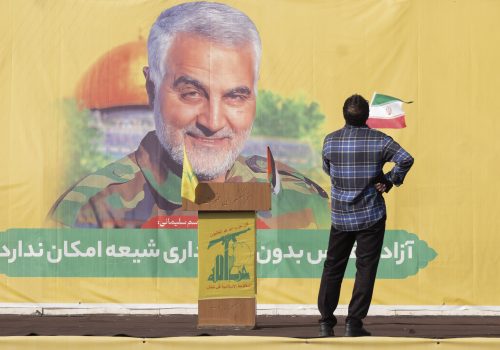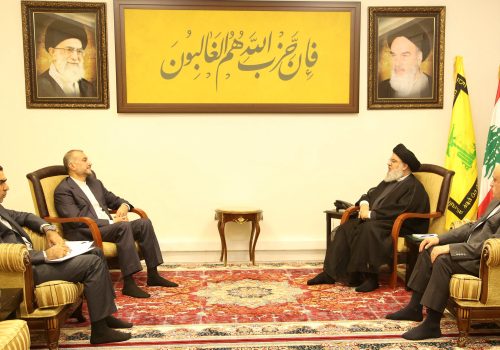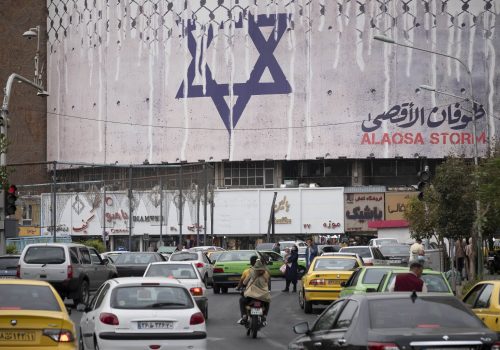The Gaza war probably won’t change Iran’s nuclear strategy. It’ll make it difficult to reach a long-term agreement, though.
Since the outbreak of the Gaza war, which followed the vicious attack by Hamas against Israeli military outposts and civilian villages near the Gaza Strip on October 7, the Islamic Republic of Iran’s position regarding the terrorist attack has become apparent.
Iran, which views Hamas as a Palestinian proxy and supports it militarily and economically, is working to achieve two primary goals. First, for the international community to reach a ceasefire that preserves Hamas’s rule in the Gaza Strip and, thus, prevents Israel from achieving its goal in the war: eliminating Hamas’s military and political capabilities. Second, to “encourage” its proxies (led by Lebanese Hezbollah) to attack Israel just below a threshold of escalation to stop Israeli military efforts and prevent it from eradicating Hamas.
Iran is currently refraining from attacking the United States—with the exception of its militias attacking US forces in Iraq and Syria—to avoid an escalation, and has been careful not to be directly involved and threatens to respond only if attacked. With that in mind, one of the main questions is whether and how Israel’s conflict in Gaza will impact Tehran’s nuclear strategy.
As of today, Iran is enriching to 60 percent and has been careful not to cross the 90 percent military-grade enrichment threshold. In August, just weeks before the Gaza war, it also reached an understanding for broader talks with the United States—the result of which was Iran’s willingness to decrease enriched uranium in exchange for economic relief in the form of unfreezing Iranian funds around the world. Furthermore, these developments led to Supreme Leader Ayatollah Ali Khamenei reportedly giving his blessing in September to the Iranian nuclear negotiation team to meet directly with their US counterparts in Oman.
Nevertheless, the campaign in Gaza should not change Iran’s nuclear strategy. For now, Iranian deterrence is working, since Tehran is not paying any price for its proxy activity with the Houthis in Yemen, Shia militias in Iraq, and Hezbollah in Lebanon, given the fact that the United States is careful not to attack Iran for fear of escalation (despite being attacked by these proxies in Iraq and Syria). In many ways, Iran may even think that its conventional deterrence—together with a robust nuclear program—is enough, and that there is no point in crossing the nuclear Rubicon.
The fact that the United States is making minor responses against attacks in Syria and Iraq can only strengthen this understanding in Tehran, as does the fact that the United States military no longer surrounds Iran in Afghanistan and Iraq (except for a limited presence that mainly serves the campaign against the Islamic State of Iraq and el-Sham and the training of local Iraqi forces).
On the other hand, despite the profound erosion of Israel’s deterrence after the tragic events of October 7, the US’s willingness to stand by Israel’s side—including its willingness to deploy troops and capabilities in the Middle East—is demonstrating to Iran that, in extreme cases, such as an Iranian nuclear breakout, the United States will not hesitate to exercise force against Iran.
The main problem in this context concerns the ability of the international community—especially the United States—to reach an agreement that would limit Iran’s nuclear activities. This was also evident in October when snapback sanctions were not imposed in response to the expiration of the United Nations ban on Iran’s ballistic missile program per UN Security Council Resolution 2231. The tension between Iran and the United States—influenced by Iran’s proxies attacking US forces, support for Hamas, and strengthening relationship with Moscow—is making it almost impossible for Washington to preserve a line of diplomacy with Tehran.
On top of that, the 2024 US presidential election and disapproving voices in Congress regarding the Joe Biden administration’s policy towards Iran will make it very difficult to approve any agreement with Tehran, assuming one is even reached. Moreover, Khamenei lost his limited trust in the United States after President Donald Trump withdrew from the Joint Comprehensive Plan of Action (JCPOA) in 2018. In light of this fact, the Biden administration’s attempt to go back on its hostage swap agreement, which allowed Iran to receive $6 billion in frozen assets in South Korean banks via Qatar to be used for a humanitarian trade channel, sharpens the futility of Tehran achieving long-term agreements with Washington.
Even if Iran does not make significant progress in its nuclear program, the political and economic pressure that is expected as a result of Tehran’s support for Hamas and the weakening relationship between Iran and the United States will increase the likelihood that the country will deepen and expand its nuclear program without crossing the 90 percent Rubicon. Iran will have no incentive to limit its nuclear program, given the pressure exerted on it from the West and the United States and the low probability of an agreement that will lift sanctions.
If pressure exerted on Iran is added via other means—sanctions on ballistic missiles and actions against Iran by the International Atomic Energy Agency’s Board of Governors—Tehran will not hesitate to take steps related to its nuclear program, such as limiting nuclear inspections as it has done in the past. Considering this option, the coming year may be characterized by an increase in tensions between the West and Iran over the latter’s advanced nuclear program, which may push Tehran towards 90 percent enrichment—not as a benchmark on its way to building a nuclear bomb, but as a move designed to discourage the international community from continuing to exert pressure.
The bottom line is that the Gaza war undermined the delicate relationship built between the United States and Iran in the last few months to probably an irreversible degree. This fact will have a significant impact on the prospect of an agreement regarding the Iranian nuclear file and introduces a severe instability dimension regarding Tehran’s nuclear program.
It is likely that Tehran still understands the serious price it may pay if it moves towards a nuclear bomb, and the increased presence of the United States in the Middle East is terrible news for it. However, the immunity that Iran enjoys will only strengthen its assessment that, at present, there is no tangible threat to the regime and, thus, its nuclear program.
Danny Citrinowicz is a nonresident fellow with the Atlantic Council’s Middle East Programs. He previously served for twenty-five years in a variety of command positions units in Israel Defense Intelligence.
Further reading
Wed, Nov 8, 2023
The Gaza war raises questions about the future of Iran’s Resistance Axis
IranSource By
The Gaza war presents the first significant test of the level of cooperation present among the elements of the Iran-led Resistance Axis.
Thu, Oct 19, 2023
Israel misread Iran’s way of war. A proper understanding could help predict Hezbollah’s next moves.
IranSource By David Daoud
Iran—through Hezbollah—has spent almost two decades and considerable effort and funds building the Gaza Strip into the Axis of Resistance’s Southern Front against Israel.
Fri, Oct 13, 2023
What do Iranians think of Israel? Their views might surprise you
IranSource By
Anyone familiar with Iranian society knows that anti-Israel attitudes have mostly failed to go beyond the most vociferous supporters of the regime despite years of attempted forced indoctrination.
Image: Iran's Supreme Leader Ayatollah Ali Khamenei visits the Iranian centrifuges in Tehran, Iran June 11, 2023. Office of the Iranian Supreme Leader/WANA (West Asia News Agency) via REUTERS


